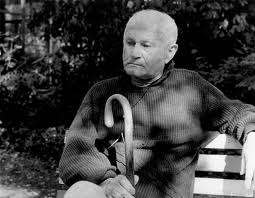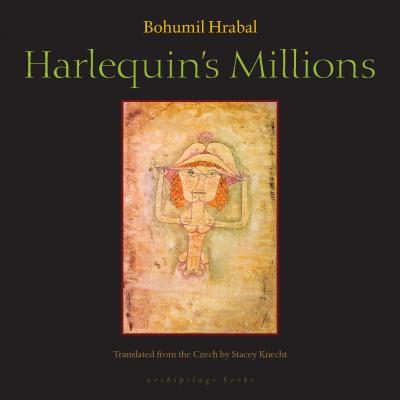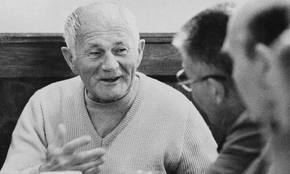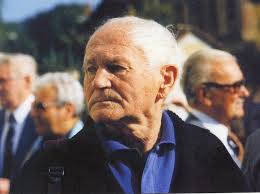Shortly before he died in 1997, Bohumil Hrabal specified that his coffin should bear the inscription Pivovar Polná or Polná Brewery. While working there as an assistant bookkeeper, his mother Marie met his step-father Francin (Hrabal never knew his biological father). They married in 1917 when the boy was three years old.
 Fifty-one years later in 1968 after Warsaw Pact forces crushed Dubček’s Prague Spring, Hrabal was prohibited from publishing in Czechoslovakia. By then he was a well-known novelist having already published two of his signature works, Dancing Lessons for the Advanced in Age (1964) and Closely Watched Trains (1965) which was made into a globally acclaimed film by Jiří Menzel in 1966. During the ban, he wrote (in one draft) and secretly published I Served the King of England as well as seven other titles including Cutting It Short, the first of a three-volume “autobiography” of his mother in which the Polná Brewery plays a starring role. The Hrabal embargo was lifted in 1975.
Fifty-one years later in 1968 after Warsaw Pact forces crushed Dubček’s Prague Spring, Hrabal was prohibited from publishing in Czechoslovakia. By then he was a well-known novelist having already published two of his signature works, Dancing Lessons for the Advanced in Age (1964) and Closely Watched Trains (1965) which was made into a globally acclaimed film by Jiří Menzel in 1966. During the ban, he wrote (in one draft) and secretly published I Served the King of England as well as seven other titles including Cutting It Short, the first of a three-volume “autobiography” of his mother in which the Polná Brewery plays a starring role. The Hrabal embargo was lifted in 1975.
 Available in English for the first time through Stacey Knecht’s bright translation, Harlequin’s Millions is the third book in the series, though it reads as a complete work. Here, the aged Marie and Francin have moved to the former medieval castle of a Count Spork, now a retirement home for a few hundred pensioners who, with a few exceptions, live in a medicated stupor amid the constant playing of the serenade from the ballet Les millions d’Arlequin. Marie depicts herself wandering observantly through the castle and grounds, describing behaviors, admiring the frescos and statuary, and remembering. Like Hrabal’s other famous narrators, she is forlorn and buoyant, proud and contrite, garrulous and at a loss, despairing and accepting.
Available in English for the first time through Stacey Knecht’s bright translation, Harlequin’s Millions is the third book in the series, though it reads as a complete work. Here, the aged Marie and Francin have moved to the former medieval castle of a Count Spork, now a retirement home for a few hundred pensioners who, with a few exceptions, live in a medicated stupor amid the constant playing of the serenade from the ballet Les millions d’Arlequin. Marie depicts herself wandering observantly through the castle and grounds, describing behaviors, admiring the frescos and statuary, and remembering. Like Hrabal’s other famous narrators, she is forlorn and buoyant, proud and contrite, garrulous and at a loss, despairing and accepting.
Now toothless and shabby, Marie had “acted for thirty years in the local playhouse and been onstage more than six hundred times.” Despite her disappointments and demise (“in the forty years we’ve been together we’ve already said everything we have to say to each other, we have no more hopes, no expectations”), she expresses a hunger for her own life, not only for her recollections but also for the aging beauty of the castle and the weakening pulses and strange habits of the pensioners. But this is Hrabal after all; Marie’s cheerful melancholy expands amid an entrenched darkness.
Hrabal’s novels revel in the enjoyment of what has not been granted. The reader is welcomed into a swarm of sentences, waves of mundane detail and a cast of characters shrewdly juxtaposed, often creating a comic effect that is happy not to be an epiphany. Such is the case with Marie’s memoirs: she enacts a desire to seek beauty in a world where the conditions for finding it are radically curtailed.
 In light of Hrabel’s brushes with the Communist authorities, his novels are often read, with justification, as critiques of state power and the repression of freedoms. But when everyone is a duped harlequin, there are no beneficent politics. At mid-story, Marie recalls the day the Council of Workers took over the nationalized brewery and Francin was dismissed as brewery manager. The vengeful brutality of that moment is poignantly captured, and not without the bleak humor of caricature. Then she says:
In light of Hrabel’s brushes with the Communist authorities, his novels are often read, with justification, as critiques of state power and the repression of freedoms. But when everyone is a duped harlequin, there are no beneficent politics. At mid-story, Marie recalls the day the Council of Workers took over the nationalized brewery and Francin was dismissed as brewery manager. The vengeful brutality of that moment is poignantly captured, and not without the bleak humor of caricature. Then she says:
“At that moment it dawned on me that for a quarter of my life and more I’d been a source of great aggravation to all the women in that little town, the wives who lived in a kitchen and one room, and that I, with my three pigs, had in fact provoked the wives of the station staff and the railroad workers, women who were willing to travel all the way to Prague with their trail pass to buy cheaper lard and bacon, while I had pails full of lard and smoked meat from the pigs I fed with waste from the brewery, with draff and sludge, the only thing we have had in common was that I never went on vacation, just like the other women, who set out in the summertime with buckets to pluck blackberries and raspberries and blueberries …”
Remorse gives way to another emotion, as if humiliation and guilt offer an unsuspected opening to a spine-stiffening self-regard, certainly an asset at the retirement home:
“And now, here in the retirement home, now that I’d had all my teeth pulled out, now that my hair was greyer than oakum, now that my figure exuded nothing but faded charm and no one could imagine the charm I[‘d once had, for the first time I was ashamed of my old age … But when I saw how all the old woman here in the castle, whom I’d driven to exasperation a quarter of a century ago with my dresses and figure, when I saw how pleased they were to see what had become of me, how it was my turn now, and they made that very clear they were thrilled with my downfall … I suddenly realized that just as I had once been proud of my youthful appearance, which I’d kept for so long, I now not only could be, but had to be, proud that I was who I was. And so I didn’t even try to wear my dentures, even when I had them, nor did I dye my hair to look like everyone else … I walked with my head held high …”
There are so many wonderful anecdotes in Harlequin’s Millions to pick from, such as Marie’s story about her failed perfume store, her foolish investment of their savings, her husband’s relief when the business closed and the delivery of unsold inventory to their house. But the novel comprises a long linkage of modest tales enlivened by the immediacy of the telling.
 Hrabal described his technique as pabeni or “palavering” – essentially a high-strung gabbing, a narrative preference he discovered in Beckett and Joyce, but also in Cervantes and even Dante. His realism is a kind of gentle hysteria; his world is undeniably ours but rendered through what pretends to be unbridled, aimless speech. It is kindled speech, Hrabal seems to be telling us, that creates the reality and for this reason he has no taste for conventional novelistic telling. His generosity is the access to actuality as it rises up in language. Here lie the pleasure and the beauty.
Hrabal described his technique as pabeni or “palavering” – essentially a high-strung gabbing, a narrative preference he discovered in Beckett and Joyce, but also in Cervantes and even Dante. His realism is a kind of gentle hysteria; his world is undeniably ours but rendered through what pretends to be unbridled, aimless speech. It is kindled speech, Hrabal seems to be telling us, that creates the reality and for this reason he has no taste for conventional novelistic telling. His generosity is the access to actuality as it rises up in language. Here lie the pleasure and the beauty.
Marie meets three pensioners who stroll arm in arm through the grounds, reeling off nineteenth-century anecdotes of the little town, and the names of people and things as if kept in mental inventory. The first time Marie hears them chatter, one after the other, she says, “I clapped my hands, because I’d never seen a performance quite like this, without a single rehearsal, just like that and just for me. When then lifted their heads and looked at me expectantly, I held out my arms and they all three grabbed my hand, they looked at me and beamed, as if they had found in me and because of me a reason to tell the story they had told so many times and hadn’t had a single reason to tell again, I was a source of inspiration and a good excuse for them to show off, to brag about what they knew …”
This is Hrabal’s praise of us, his readers, the necessary good excuses for showing off.
For Marie, the endless loop of “Harlequin’s Millions” on the loudspeakers “lent a frayed, doleful, amorous tone to the voices of the three witnesses to old times.” Are there two kinds of novel readers? The first, who can hear those plangent tones in the candid presence of the actual – and the others, in need of conventional solace, who hear only monotonous noise in a writer like Hrabal?
[Published by Archipelago Books on May 6, 2014. 312 pages, $18.00 paperback]